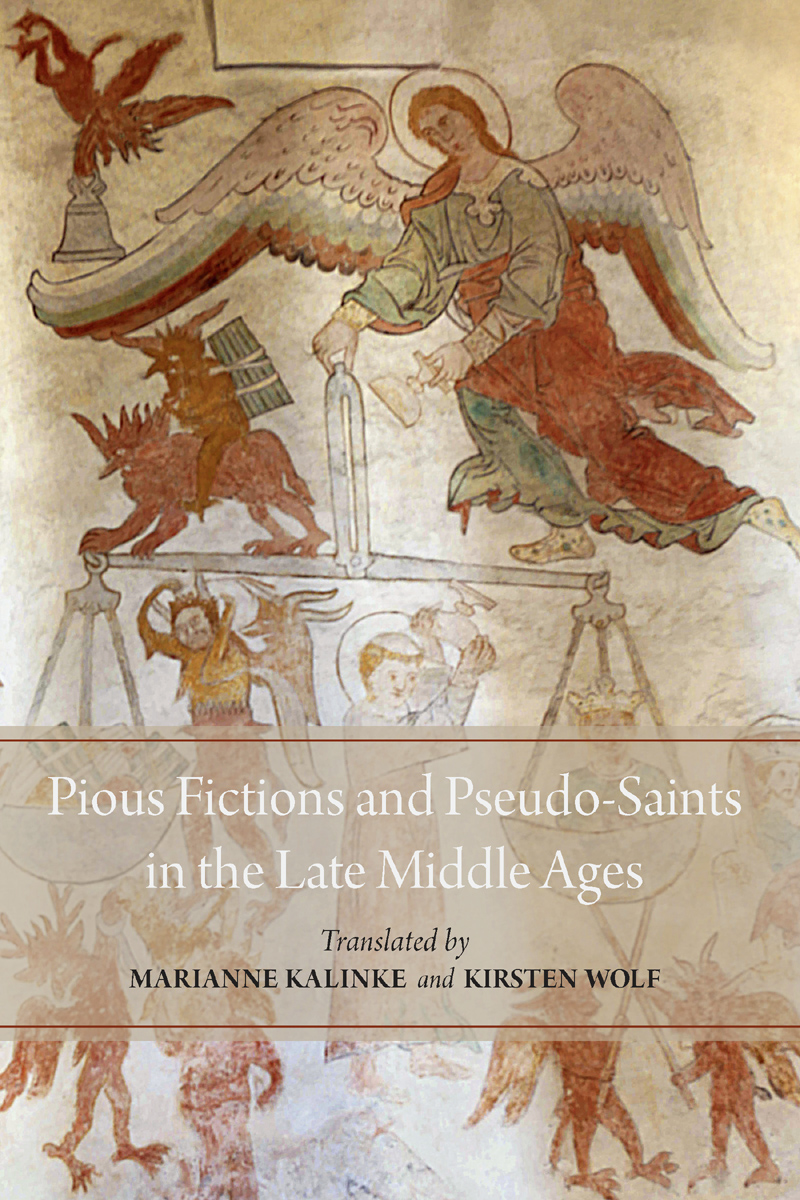
Pious Fictions and Pseudo-Saints in the Late Middle Ages: Selected Legends from an Icelandic Legendary
Mediaeval Sources in Translation 61. xii, 282 pp. ISBN 978-0-88844-311-3 • Paper • $35.00
This volume provides English translations of selected legends from a remarkable sixteenth-century Icelandic collection known as the Reykjahólabók. The Middle Low German originals it translates are no longer extant, apocryphal wholly or in part, and wondrous strange. The volume also includes a wide-ranging introduction that surveys the historical and literary contexts for the translation of Catholic saints’ lives on the eve of the Protestant Reformation in Iceland, as well as normalized editions of the legends accessible to readers of contemporary Icelandic.
The eight legends translated here detail the adventures of St Oswald and his quest for a bride by a garrulous raven; Henry and Cunegund, and her accusation of infidelity and trial by ordeal; John Chrysostom, the Golden-mouthed, and his hairy-anchorite tale; Jerome and an injured lion, who herds asses for the monastery; Christopher, the giant Reprobus, who bears the Christ child across deep waters; George, the Dragon-slayer, who saves a princess from the devouring monster; the Seven Sleepers of Ephesus, who escape persecution by Emperor Decius through centuries-long slumber; and Gregorius, the Good Sinner, in a tale of double incest. In fictionalizing the lives of established saints, and in the creation of fictitious saints, these legends represent the concluding chapter of medieval hagiography.
Authors
Marianne Kalinke is Center for Advanced Study Professor Emerita of Germanic Languages and Comparative Literature at the University of Illinois, Urbana-Champaign. She is an authority on cultural and literary relations between Scandinavia and the continent in the medieval and early modern period. Her study of the transmission of the Arthurian legend to Norway and Iceland, King Arthur, North-by-Northwest (1981), reconsidered the impact of continental romance on the development of indigenous Icelandic saga genres, while Bridal-Quest Romance in Medieval Iceland (1990) revised the received classification of Icelandic literary genres. The Book of Reykjahólar: The Last of the Great Medieval Legendaries (1996) considered the role of Iceland in preserving German hagiographic texts that have otherwise been lost. Most recently, Stories Set Forth with Fair Words: The Evolution of Medieval Romance in Iceland (2017) focuses on the origin and development of the earliest translated and indigenous romances in Iceland.
Kirsten Wolf is Professor and Torger Thompson Chair in the Department of German, Nordic, and Slavic at the University of Wisconsin-Madison, where she teaches Old Norse-Icelandic language and literature and Scandinavian linguistics. She has written extensively on hagiography, color, non-verbal communication and has edited several Old Norse-Icelandic texts, including Gyðinga saga and the legends of Saints Anne, Barbara, and Dorothy. Her most recent single-authored book is The Legends of the Saints in Old Norse-Icelandic Prose (2013). Her book, The Priest’s Eye: AM 672 4to in The Arnamagnaean Collection, is forthcoming in Manuscripta Nordica: Early Nordic Manuscripts in Digital Facsimile.
Ordering
Customers in North America please order through University of Toronto Press Distribution by phone (1-800-565-9523) or by email (utpbooks@utpress.utoronto.ca). If you would like to order through UTP Distribution using another method such as mail or fax, please click here for a full list of contact and ordering methods. PIMS books are also available on Amazon.ca (for Canadian customers) and Amazon.com (for customers in the U.S.).
Customers outside North America please order through Brepols Publishers. PIMS books are available through the Brepols online catalogue.
To view our desk copy policy, click here.


